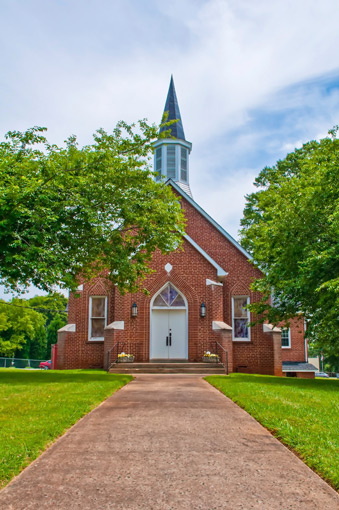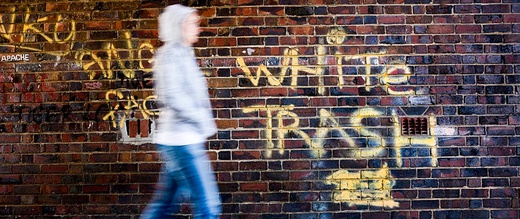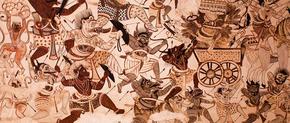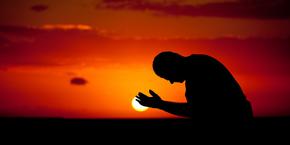The views expressed in our content reflect individual perspectives and do not represent the authoritative views of the Baha'i Faith.
In my experience, most people grow up with some religious prejudice.
I know I did, anyway. Raised a Lutheran, and spoon-fed church dogma and doctrine from as early as I could sit in a church pew, I grew up believing that the Lutherans were God’s chosen people. (Because most Scandinavians have a Lutheran heritage, you probably already know the old joke–that Lutherans are God’s Frozen People) When you’re raised in a religion, you just naturally accept, as a child, that your religion is the right one. You don’t think about it–you just know your parents and your grandparents must be right about most everything, and you figure they’re right about religion, too.
 So like most of us, I first encountered religious prejudice as a child. I can remember passing the Presbyterian church in our little town, me riding along with a boyhood friend, his father driving, and the father saying “buncha rednecks” under his breath when we passed the church. I didn’t understand this until I grew up, but the derogatory term “redneck” originally applied to Scottish immigrants to the American South in the 1830s—who were chiefly Presbyterians. Their slang name came about because they rebelled against the corrupt Scottish Episcopal bishops, signed their manifestos in blood, and wore red kerchiefs around their necks as a sign of their rebellion. Today, of course, the word “redneck” means something entirely different—but it started as a slur against the Presbyterians in the 17th Century, and then transplanted itself to the South. I’m sure my friend’s prejudiced Lutheran father meant “Southerners” when he referred to Presbyterians as rednecks—I do remember that most of the people who went to that church had pronounced Southern accents—but he might not have said that if he’d known the true origin of the term.
So like most of us, I first encountered religious prejudice as a child. I can remember passing the Presbyterian church in our little town, me riding along with a boyhood friend, his father driving, and the father saying “buncha rednecks” under his breath when we passed the church. I didn’t understand this until I grew up, but the derogatory term “redneck” originally applied to Scottish immigrants to the American South in the 1830s—who were chiefly Presbyterians. Their slang name came about because they rebelled against the corrupt Scottish Episcopal bishops, signed their manifestos in blood, and wore red kerchiefs around their necks as a sign of their rebellion. Today, of course, the word “redneck” means something entirely different—but it started as a slur against the Presbyterians in the 17th Century, and then transplanted itself to the South. I’m sure my friend’s prejudiced Lutheran father meant “Southerners” when he referred to Presbyterians as rednecks—I do remember that most of the people who went to that church had pronounced Southern accents—but he might not have said that if he’d known the true origin of the term.
This kind of religious prejudice would seem ironic and hilarious if it weren’t so hostile and destructive. After all, both the Lutherans and the Presbyterians believe in the same prophet—Jesus Christ—and only really differ in the details of their worship. Both are Protestant churches, and got that way because their leaders wanted to practice a purer, more authentic Christianity than they experienced in the powerful, dominant churches of the time. But like in many other groups, the bigots and the xenophobes in religions see and focus on the differences, not on the similarities.
In determining the truth about your beliefs, no greater obstacle exists than religious prejudice.
Do you have any? Give it some thought for a moment. The Baha’i teachings speak out very strongly about such prejudice, asking everyone to work hard to rid themselves of its ignorant, pernicious effects:
…man can never hope to attain unto the knowledge of the All-Glorious, can never quaff from the stream of divine knowledge and wisdom, can never enter the abode of immortality, nor partake of the cup of divine nearness and favour, unless and until he ceases to regard the words and deeds of mortal men as a standard for the true understanding and recognition of God and His Prophets. – Baha’u’llah, The Book of Certitude, pp. 3-4.
Baha’is believe strongly that religious prejudice has caused enormous suffering and death in the world:
Religious hatred and rancor is a world-consuming fire, and the quenching thereof most arduous, unless the hand of divine might give men deliverance from this unfruitful calamity. Beware of prejudice; light is good in whatsoever lamp it is burning. A rose is beautiful in whatsoever garden it may bloom. A star has the same radiance if it shines from the east or the west.
All the prophets of God have come to unite the children of men and not to disperse them; to put in action the law of love and not enmity.
We must banish prejudice. Religious, patriotic, racial prejudices must disappear, for they are the destroyers of human society. We must become the cause of the unity of the human race. – Abdu’l-Baha, Divine Philosophy, p. 25.
If we have the objective investigation of the claims of religion as our goal, we have to banish any and all religious prejudice, as Abdu’l-Baha suggests. Our subtle childhood feelings of superiority or cultural privilege must find their rightful place in the rubbish bin of obsolescent and outworn thoughts and emotions. With every fiber of our beings, we should exert our maximum effort to free ourselves from such prejudices, so unworthy of any intelligent and sincere seeker of truth:
…since the prophets themselves, the founders, have loved, praised and testified of each other, why should we disagree and be alienated? God is one. He is the shepherd of all. We are his sheep and therefore should live together in love and unity. We should manifest the spirit of justness and good-will toward each other. Shall we do this or shall we censure and pronounce anathema, praising ourselves and condemning all others? What possible good can come from such attitude and action? On the contrary, nothing but enmity and hatred, injustice and inhumanity can possibly result. Has not this been the greatest cause of bloodshed, woe and tribulation in the past? – Abdu’l-Baha, Foundations of World Unity, p. 99.
Shall we remain steeped in our fanaticisms and cling to our prejudices? Is it fitting that we should still be bound and restricted by ancient fables and superstitions of the past, be handicapped by superannuated beliefs and the ignorances of dark ages, waging religious wars, fighting and shedding blood, shunning and anathematizing each other? Is this becoming? Is it not better for us to be loving and considerate toward each other? Is it not preferable to enjoy fellowship and unity, join in anthems of praise to the most high God and extol all His Prophets in the spirit of acceptance and true vision? Then, indeed, this world will become a paradise, and the promised Day of God will dawn. Then, according to the prophecy of Isaiah, the wolf and the lamb will drink from the same stream, the owl and the vulture will nest together in the same branches, and the lion and the calf pasture in the same meadow. What does this mean? It means that fierce and contending religions, hostile creeds and divergent beliefs will reconcile and associate, notwithstanding their former hatreds and antagonism. Through the liberalism of human attitude demanded in this radiant century they will blend together in perfect fellowship and love. This is the spirit and meaning of Isaiah’s words. There will never be a day when this prophecy will come to pass literally, for these animals by their natures cannot mingle and associate in kindness and love. Therefore, this prophecy symbolizes the unity and agreement of races, nations and peoples who will come together in attitudes of intelligence, illumination and spirituality. – Abdu’l-Baha, The Promulgation of Universal Peace, p. 369.
You May Also Like
Comments

















The president of the Australian Esperanto Assoc out of the blue and with little warning has asked me to guest speak at a flag ship event on the Esperanto calendar - Winter School. They have specifically requested: What Differentiates the BF From Other Religions. THANKS. Paulo